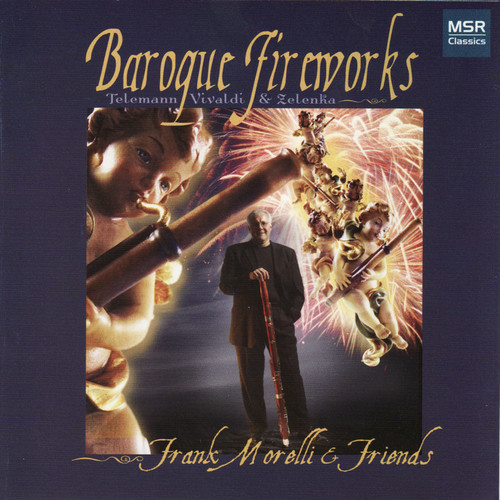
Baroque Fireworks: Telemann, Vivaldi & Zelenka
At the dawn of the Baroque era, Venetian composer Giovanni Gabrieli and his followers developed the concertato style of composition. One result of this innovation was to encourage composers throughout Europe to explore the expressive and technical solo possibilities of instruments like the bassoon, traditionally relegated to non-solo roles. More than a century later, late Baroque masters Antonio Vivaldi, Georg Philipp Telemann and Jan Dismas Zelenka, all born within a three-year span, composed some of the finest and most challenging music ever written for the bassoon. This recording features several works from this era.
For this recording a bassoon, rather than the cello, was used as the bass continuo instrument in combination with the harpsichord, except in the Zelenka Trio, where the composer specified violone as one of the instruments of choice. Accordingly, the modern double bass was employed here.
Introduced to the bassoon while in public school in his hometown of Massapequa, New York, Frank Morelli studied with Stephen Maxym at the Manhattan and Juilliard Schools of Music, and was the first bassoonist to be awarded a doctorate by the Juilliard School. With over 140 recordings for major labels to his credit, his recording of the Mozart Bassoon Concerto with Orpheus on the DG label won international critical acclaim. The Orpheus CD "Shadow Dances," which features Morelli, won a 2001 Grammy. He has made eight appearances as a soloist in Carnegie Hall and has appeared with the Chamber Music Society of Lincoln Center on numerous occasions, including at the Whitehouse for the final state dinner of the Clinton presidency. A member of the renowned quintet, Windscape, ensemble-in-residence at the Manhattan School of Music, he also serves on the faculties of the Juilliard, Yale and SUNY Stony Brook. He is editor of the landmark excerpt book, "Stravinsky: Difficult Passages for! Bassoon", published by Boosey & Hawkes. Frank Morelli is principal bassoonist of the New York City Opera Orchestra, Orpheus Chamber Orchestra and the American Composers Orchestra.
